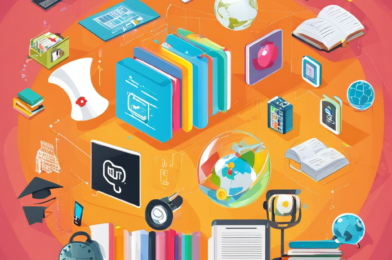The education landscape is undergoing a significant transformation, and technology is at the heart of this change. The role of technology in modern education is becoming increasingly prominent, shaping how students learn and interact with their peers and instructors. From digital textbooks and online courses to interactive learning apps and virtual reality experiences, technology is enhancing the way knowledge is delivered and acquired.
One of the key benefits of technology in education is its ability to personalize learning experiences. Students can now access a wealth of resources and tailor their learning journey to their unique needs and preferences. For example, online platforms and educational software allow students to learn at their own pace, revisiting concepts as needed and advancing through material that challenges them. This level of customization was not possible with traditional teaching methods, where a one-size-fits-all approach often prevailed.
Technology also enables interactive and engaging learning experiences. Through multimedia content, simulations, and game-based learning, students are actively involved in their education. This interactive approach improves student motivation and makes complex concepts more accessible and memorable. For instance, virtual reality can transport students to historical events or far-flung places, providing immersive experiences that enhance their understanding of a subject.
Online learning platforms and massive open online courses (MOOCs) have revolutionized accessibility in education. Students from remote areas or with physical disabilities can now access quality education from the comfort of their homes. This democratization of knowledge breaks down geographical barriers and provides equal opportunities for all, ensuring that anyone with an internet connection can pursue their academic goals.
Moreover, technology fosters collaboration and connectivity among students. Online discussion forums, group projects facilitated by collaborative tools, and social media platforms dedicated to learning encourage students to share ideas, provide peer support, and engage in meaningful discussions. These interactions enhance critical thinking, communication skills, and a sense of community, even when students are physically distant from one another.
In addition, technology integrates seamlessly with blended learning approaches, combining online and traditional classroom methods. This blend allows instructors to supplement their teachings with digital resources, providing a more dynamic and comprehensive learning experience. For example, instructors can assign online modules for students to complete before class, freeing up class time for discussions and activities that reinforce the material.
The use of technology in education also prepares students for the digital workplace. As technology advances and shapes various industries, employers seek individuals proficient in using digital tools and comfortable with new technology. By integrating technology into the curriculum, students develop the digital skills and mindsets needed to succeed in tomorrow’s workforce.
Another advantage of technology in education is the instant feedback and assessment capabilities it offers. Interactive quizzes, automated grading systems, and personalized dashboards help students track their progress and receive immediate feedback on their performance. This real-time feedback enables students to identify areas of improvement and allows instructors to provide targeted support, enhancing the overall learning outcomes.
Technology also plays a crucial role in supporting life-long learning. Online platforms and mobile apps make it convenient for individuals to pursue new skills and knowledge throughout their lives. Whether learning a new language, developing coding skills, or exploring a hobby, technology provides accessible and flexible avenues for continuous personal growth and development.
Lastly, technology enables educators to gather and analyze data on student performance. Through learning analytics, instructors can identify patterns, track student progress over time, and adapt teaching strategies accordingly. This data-driven approach allows for more informed decision-making and the development of targeted interventions to support struggling students.




